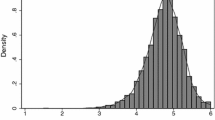Abstract
Economic theory suggests that it is optimal to reward teachers depending on the relative performance of their students. We develop an econometric approach, based on stochastic frontier analysis, to construct a fair ranking that accounts for the socio-economic background of students and schools and the imprecision inherent in achievement data. Using German PIRLS (IGLU) data, we exploit the hierarchical structure of the data to estimate the efficiency of each teacher. A parsimonious set of control variables suffices to get a “fair” estimate of unobserved teacher quality. A Hausman–Taylor type estimator is the preferred estimator because teacher efficiency and some exogenous variables may be correlated.
Similar content being viewed by others
References
Angrist JD, Guryan J (2004) Teacher testing, teacher education, and teacher characteristics. Am Econ Rev 94:241–246
Ballou D (2001) Pay for performance in public and private schools. Econ Educ Rev 20:51–61
Black SE, Lynch LM (2001) How to compete: the impact of workplace practices and information technology on productivity. Rev Econ Stat 83:434–445
Fertig M, Kluve J (2005) The effect of age at school entry on educational attainment in Germany. RWI Discussion Papers No. 27
Goldstein, H (1997) Methods in school effectiveness research. School Eff School Improv 8:369–395
Gong B, Sickles RC (1992) Finite sample evidence on the performance of stochastic frontiers and data envelopment analysis. J Econom 51:259–284
Hanushek EA, Kain JF, Rivkin SG (1999) Do higher salaries buy better teachers? NBER Working Paper 7082
Hanushek EA, Raymond ME (2004) The effect of school accountability systems on the level and distribution of student achievement. J Eur Econ Assoc 2:406–415
Hausman JA, Taylor WE (1981) Panel data and unobservable individual effects. Econometrica 49:1377–1398
Hoxby CM (2002) The cost of accountability. NBER Working Paper 8855
Jacob BA (2005) Accountability, incentives and behavior: the impact of high-stakes testing in the Chicago Public Schools. J Public Econ 89:761–796
Jürges H, Schneider K, Büchel F (2005a) The effect of central exit examinations on student achievement: quasi-experimental evidence from TIMSS Germany. J Eur Econ Assoc 3:1134–1155
Jürges H, Richter WF, Schneider K (2005b) Teacher quality and incentives. Theoretical and empirical effects of standards on teacher quality. FinanzArchiv 61:1–25
Jürges H, Schneider K (2006) Age at school entry and teacher’s recommendations for secondary school track choice in Germany. Paper presented at the 20th annual ESPE conference, Verona
Kane TJ, Staiger DO (2002a) Volatility in school test scores: implications for test-based accountability systems, Brookings Papers on Education Policy 2002, pp 235–283
Kane TJ, Staiger DO (2002b) The promise and pitfalls of using imprecise school accountability measures. J Econ Perspect 16:91–114
Kumbhakar SC, Lovell CAK (2000) Stochastic Frontier analysis. Cambridge University Press, Cambridge
Ladd HF, Walsh RP (2002) Implementing value-added measures of school effectiveness: getting the incentives right. Econ Educ Rev 21:1–17
Lavy V (2002) Evaluating the effect of teachers’ group performance incentives on pupil achievement. J Polit Econ 110:1286–1317
Lavy V (2004) Performance pay and teachers’ effort, productivity and grading ethics, NBER Working Paper 10622
Mullis IVS, Martin MO, Gonzalez EJ, Kennedy AM (2003) PIRLS2001 International Report: IEA’s Study of Reading Literacy Achievement in Primary Schools. Boston College, Chestnut Hill MA
Payne J (2000) School teachers’ review body gives green light to performance-related pay. http://www.eiro.eurofound.eu.int/2000/11/feature/uk0011100f.html
Propper C, Wilson D (2003) The use and usefulness of performance measures in the public sector. Oxford Rev Econ Policy 19:250–267
Puhani P, Weber A (2005) Does the early bird catch the worm? Instrumental variable estimates of the educational effects of age at school entry in Germany. IZA Discussion Paper 1827
Skrondal A, Rabe-Hasketh S (2004) Generalized latent variable modeling Multilevel, longitudinal and structural equation models. Chapman & Hall/CRC, Boca Raton
Sickles RC (2005) Panel estimators and the identification of firm-specific efficiency levels in parametric, semiparametric and nonparametric settings. J Econom 126:305–334
Sullivan K (1999) Teachers standards and professionalism: contested perspectives in a decade of reform. Paper presented at the AARE-NZARE 1999. http://www.aare.edu.au/99pap/ sul99090.htm
West MR, Wößmann L (2006) Class-size effects in school systems around the world: evidence from between-grade variation in TIMSS. Eur Econ Rev 50:695–736
Author information
Authors and Affiliations
Corresponding author
Rights and permissions
About this article
Cite this article
Jürges, H., Schneider, K. Fair ranking of teachers. Empirical Economics 32, 411–431 (2007). https://doi.org/10.1007/s00181-006-0112-3
Accepted:
Published:
Issue Date:
DOI: https://doi.org/10.1007/s00181-006-0112-3




